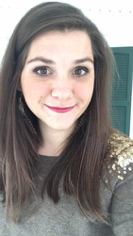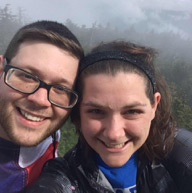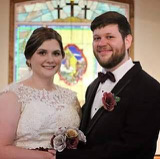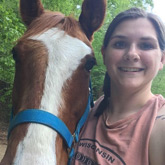 Name: Morgan Stidham
Name: Morgan Stidham
Undergrad Education: BS in Community Medical Dietetics from Viterbo University in Wisconsin
Current UA Online Program: MS in Human Nutrition
City: Hazard, Kentucky
Job: Clinical Dietitian for Appalachian Regional Healthcare
Fun Fact: I’m a self-proclaimed “old lady at heart” who enjoys jigsaw puzzles, cats and vintage Pyrex.
Morgan Stidham was recently named Kentucky’s 2019 Recognized Young Dietitian of the Year. In addition to winning an award and working a full-time job, Morgan is also earning her master’s in Human Nutrition through our online program and working on a paper for publication, so we were thrilled she made time to chat with us about her experiences.
UAO: So tell us about your award!
MS: It’s awarded to someone under the age of 30 who has shown leadership through legislation, research, education, etc. and reflects concerns about the promotion of health and an optimal nutrition status for the community.
UAO: Alright, so toot your own horn — tell us how you’ve shown that leadership.
MS: I’ve been working with Dr. Douglas on a systematic review that will be submitted to a national conference and submitted for publication this fall. I’m also the lead dietitian here, so I’ve already taken that step. And I’m also going to serve on the reimbursement committee of the Kentucky Academy of Nutrition and Dietetics.
UAO: Congratulations again! Sounds like they recognize and applaud your research and leadership thus far in your career. And how does the master’s in Human Nutrition fit into and help you advance in your career goals?
 MS: It fits perfectly. Every class I’ve taken has applied to what I do in some way. And they’ve all been interesting to me! My favorite class was actually Dr. Douglas’ class on nutrition support for the critically ill. I cover a lot of ICU beds in my role here, so I learned a lot from that class that I was able to apply and also share with my co-workers.
MS: It fits perfectly. Every class I’ve taken has applied to what I do in some way. And they’ve all been interesting to me! My favorite class was actually Dr. Douglas’ class on nutrition support for the critically ill. I cover a lot of ICU beds in my role here, so I learned a lot from that class that I was able to apply and also share with my co-workers.
UAO: Awesome. And why did you choose the UA Online program?
MS: A co-worker was getting his master’s from another program and as he finished it, I was talking to him about it and realized it was something I wanted to do, and he actually found Alabama’s program. When I started looking at it, I realized you’re able to choose from three different tracks — clinical, community or general — and I wanted to do the clinical track. But then there was also some freedom with electives so that if there was anything else I wanted to focus on, I could do that through my electives. And then it was affordable, which is a really big factor. Out of all the programs I looked at, Alabama’s classes looked the most interesting and pertinent to what I do.
UAO: What’s your favorite thing about the program so far?
MS: Other than Dr. Douglas’ class and the fact that you can choose your own track, I think the fact that it’s all online. I can do my coursework on my own time and even listen to lectures at work. My husband and I are both working on our master’s degrees, and managing our time is important. And I can take my proctored exams from home; since I live in a rural area, it’s helpful that I don’t have to go somewhere for that, so just the flexibility of it is great.
 UAO: Students in distance and online programs sometimes complain about lacking community. How has the community aspect of this program been?
UAO: Students in distance and online programs sometimes complain about lacking community. How has the community aspect of this program been?
MS: I think it’s really good. In every class, they do an introduction board and you start to recognize names, and there’s several students that I’ve had a couple of different classes with. All the professors are very open to students who may need to call rather than send an email. Dr. Douglas and I have monthly chats as we’re working on our paper together, so I feel very connected to the faculty and fellow classmates in the program.
UAO: Speaking of the paper with Dr. Douglas — is that an opportunity you would have known about if you weren’t in the program?
MS: I don’t think I would have been able to do it if I weren’t in the program. I wrote a paper for her class, and in her feedback, she encouraged me to consider submitting it for publication, so I reached out to her and she has helped walk me through the process. But without her, there is no way I could do it. There’s so much to learn in the entire publication process. And I’m able to use it as my capstone project for credit in the program, too.
UAO: How will this program help you reach your career goals?
MS: Ever since I started covering the ICU, I’ve known I wanted to take the Certified Nutrition Support Clinician Exam, and the coursework for this program has given me a good foundation to prepare for that, which is sort of my next step.
 UAO: What’s one tip you have for people who may be considering a UA Online program?
UAO: What’s one tip you have for people who may be considering a UA Online program?
MS: When I was weighing my options, I had a lot of questions and everyone was so helpful to me, so reach out and ask them the questions you have. Also, I had never taken an online class before, so the thought of undertaking an entire online program was intimidating to me, but they do a great job with the Bama Ready orientation that shows you how to navigate everything in Blackboard. That was very helpful. You have a lot of support there even though you’re not physically there. They really help you through the whole process.
For more about our master’s in Human Nutrition, visit the program website.
Published: August 30th, 2020

